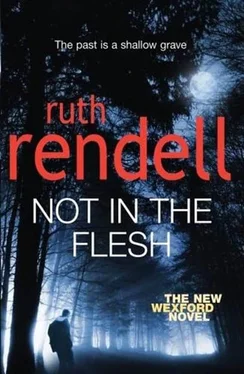The shop sold cakes and pies and frozen food, ice cream and elaborate desserts, as well as fruit and vegetables. Everything was pristine and neatly kept. Damon, always hungry, asked if he could buy a black-currant pie, a request that earned a frown from Barry and a sharp suggestion that they should move on. They were taken into an administrative office, Bailey telling them with excusable pride that the names of everyone who had ever worked for them were kept on record, names and home addresses even if their homes were (as was the case recently) in Sofia or Krakow or on the Black Sea coast.
One of the women seated at a computer offered to produce a printout of the list of names and addresses for September 1998 and handed Barry a sheet of paper with a formidable catalog of workers on it. A quick glance told him that none of these people hailed from Eastern Europe. Well, a lot had happened in those intervening eight years.
“A good many of the people here have no home addresses,” he said.
“Well, they wouldn't, would they? Not if they were travelers.”
Barry counted twenty-two names, of whom twelve were women. As far as he could see, there was no way of telling which his man was-even supposing he had worked for Morella's.
“I know this is a question I can't expect you to answer,” Damon said, “but would any of you remember a man in a T-shirt with a black scorpion and the name ‘Sam’ in red on it?”
“Funny sort of pet,” said the woman who had done the printout, “but I suppose it takes all sorts to make a world.”
When the laughter had died down, Damon explained that the scorpion wasn't real but printed on the fabric, and he showed them the photograph. They all looked at it, Bailey with rather more concentration than the others. But, “No,” he said for all of them. “No, it doesn't ring any bells.”
A phone call from his daughter Sheila was what determined Wexford's evening task. “Have you read that book I gave you yet, Pop?”
“The First Heaven? No, I haven't.” He added, like the little boy he had once been, “Do I have to?”
“Well, I should think you'd want to, considering I'm starring in the film.”
“I'll give it a go,” he said rather disconsolately. It was a funny thing how the time came when your children started talking to you the way your parents had. And you answered them much as you had answered your parents. There was only quite a short gap between acquiescing to the strictures of Mum and Dad and placating and obeying your children. He had hoped to spend this rare free evening sitting beside Dora and watching a DVD of Don't Look Now. Instead he helped himself to the essential glass of claret and opened The First Heaven.
A man he knew very well without quite being able to call him a friend was Burden's brother-in-law, who was a publisher. Or, more correctly, a publisher's editor. Wexford had often thought what a bore and a chore it must be for such people, not to be able to read what they chose, as was the case with him when he had the time, but always to be obliged to read the manuscripts of authors whose books they published. Amyas, Burden's brother-in-law, had told him the only chance he got to reread Anthony Powell, his favorite writer, was when he was away on holiday.
Thinking of Selina Hexham's Gone Without Trace, which hadn't been his chosen reading matter, he reflected that he was fast going that way himself. He began to read. When he reached the foot of page one he remembered another thing Amyas had said, that an experienced editor could tell from the first page whether a novel was any good or not. Well, he wasn't an experienced editor or any sort of editor at all and he couldn't tell. Perhaps it was only that he didn't care for fantasy. The fantasy here made itself plain from halfway down that first page. And by the time he came to the end of chapter one, Tredown was showing his predilection, if not for characters from Genesis and Kings, for biblical language. There were a great many “hast thous” and “whence comeths,” and in chapter two even the animals addressed one another in this manner.
He could appreciate some of the descriptions of a prehistoric earth. They were on a grand scale and showed that an exceptionally fertile imagination had been at work. But they went on and on and sometimes in the minutest detail so that he found himself skipping whole paragraphs. When Tredown began describing the appearance of Baal, of Ashtaroth and Dagon, he closed the book, fetched himself another glass of wine, and went to find Dora. He had missed only a quarter of an hour of Don't Look Now, which mattered hardly at all as he had seen it before.
At about two in the morning he woke up. The germ of an idea had awakened him and now it began to grow and flourish. Suppose it was for Athelstan House that Hexham had been bound that rainy afternoon? Suppose he was on his way to see Tredown to undertake research for him. Tredown wanted someone who could advise him in two areas, mythic deities and prehistoric creatures. Maybe more than that. It should include basic biology and the origin of life.
Wexford had read that note in Hexham's handwriting so many times that now he had it off by heart. “Fact-finding? Proofreading? Editing?” And above that a list of names of publishers and authors. Tredown hadn't been among them, but that meant very little. When Hexham made the list he might never have read anything of Tredown's. But suppose, when he did, that he discovered inaccuracies or anachronisms? He might then have thought that this particular author was in need of advice and have offered his services. The trouble with this theory was that while Hexham was the ideal adviser on the prehistoric fauna and the deities in The First Heaven, as far as Wexford knew he wasn't an expert on Bible history. The picture his daughter had presented of him made it extremely unlikely this was the case.
But things would look very different if Hexham had written to Tredown correcting inaccuracies in the writer's description of Baal worship or Dagon rituals, both of which figured in The Queen of Babylon, suggesting he needed help in these areas. And Tredown might have replied to this letter, telling Hexham that he planned an ambitious novel, combining the theory of evolution with Middle Eastern mythology, and would very much appreciate the services of a researcher. There were holes in this reconstruction, but still Wexford liked it. Researching would account for what Hexham was doing in that tiny box room if not for the secrecy. But some people simply were secretive, though it was difficult to justify keeping such an innocent occupation from a beloved wife.
Selina or Vivien might have the answers.
Everyone has a phone, Lyn told herself. Whatever they lack, they have a phone. These days even those who live permanently on camping sites have mobiles. Seated in front of her computer for long hours-absently helping herself to sugar-free sweets from a pack on her lap-Lyn found only two phone numbers among the men on the list. One was for an address in Stockton-on-Tees, the other in Penzance. Not much to her surprise by this time, a woman answered in each case. In the case of the former man, a William Green, the woman, who sounded very old, was his aunt. Of course. These men were permanently on the road. If they gave addresses, they would be those of their relatives and sure to be women, Lyn thought. Men tended to be rovers, wild, not anchored, while women clung to their homes. This wasn't sexist thinking. Lyn had been too thoroughly indoctrinated by Hannah to fall into that trap. It was a good thing, a sane sensible thing, to want to have your own place, your nest, your refuge.
William Green's aunt, his late uncle's widow, also called Green, could tell her very little about her nephew. In her quavering voice she said she hardly ever saw him, she didn't know where “the lad” was now, the last time she had seen him was six years ago. That was enough for Lyn. The man in Grimble's cellar had been dead two years by then. The other man, Frank Maniora, had given the address of a closer relative, his sister. This time she was surprised. Fernanda Maniora spoke with a Caribbean accent. For some reason she couldn't now account for, Lyn had assumed without thinking much about it that everyone on the list was white.
Читать дальше











